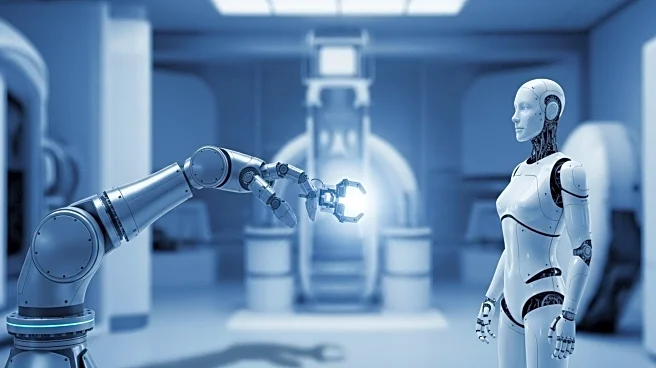What's Happening?
A recent survey conducted by StudioRed involving over 200 robotics product developers and industrial designers indicates significant advancements in robotics technology. The study highlights key trends such as autonomy, digital twins, and humanoid robots, while also addressing challenges related to cost, safety, and ethics. Robotics development is primarily focused on consumer electronics, manufacturing, and biotech sectors. The survey reveals that high-level adaptive autonomy is expected to be achievable within five years, allowing robots to perform tasks without constant human oversight. Digital twins are increasingly being adopted, with many organizations already using them extensively. Humanoid robots are anticipated to become highly significant in logistics, warehousing, and manufacturing, with a projected market value of $38 billion by 2035. However, high implementation costs and ethical concerns, including job displacement and accountability for errors, remain significant barriers.
Why It's Important?
The findings from the survey underscore the transformative potential of robotics across various industries, including consumer electronics, manufacturing, and biotech. The anticipated advancements in autonomy and humanoid robots could lead to increased efficiency and innovation in these sectors. However, the high costs associated with implementing these technologies may limit their accessibility and widespread adoption. Ethical concerns, particularly regarding job displacement and accountability, pose challenges that need to be addressed to ensure public acceptance and trust. Demonstrating tangible benefits to everyday life is crucial for gaining wider acceptance of robotics technology.
What's Next?
As robotics technology continues to evolve, stakeholders in the industry will need to address the challenges identified in the survey, particularly those related to cost and ethics. Efforts to reduce implementation costs and enhance safety and reliability will be essential for broader adoption. Additionally, addressing ethical concerns, such as job displacement, will be critical to gaining public trust. The industry may see increased collaboration between developers, policymakers, and ethicists to navigate these challenges and maximize the benefits of robotics technology.
Beyond the Headlines
The survey highlights the potential for robotics to significantly impact everyday life, but it also raises important ethical questions. As robots become more autonomous and humanoid, issues of accountability and job displacement will become increasingly relevant. The industry must consider the long-term implications of these technologies on society and work towards solutions that balance innovation with ethical responsibility.









